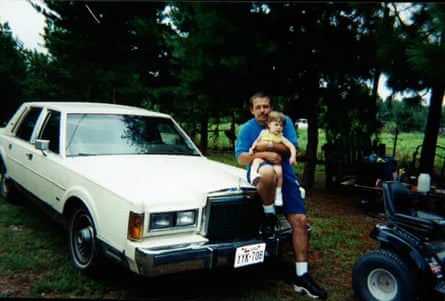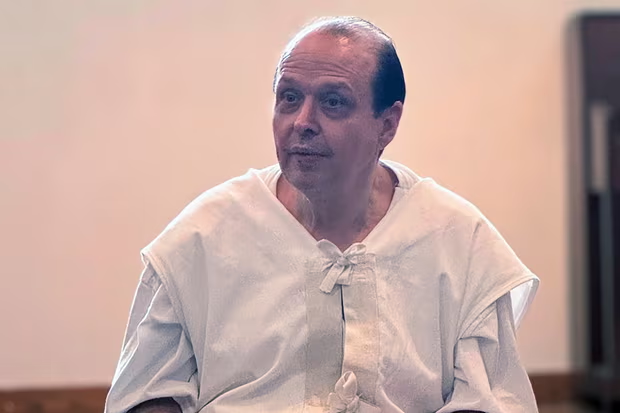The Texas supreme court has blocked the execution of a man on death row in a late-night ruling on the day of the scheduled lethal injection.
Robert Roberson, 57, was convicted of killing his two-year-old daughter more than two decades ago, but his supporters across the US and the lead detective on the case have insisted he is innocent and that the case rested on junk science.
A committee of more than 80 Texas lawmakers, including at least 30 Republicans, had asked the parole board and governor to stop the execution and had subpoenaed Roberson to testify next week in a last-ditch effort. A judge in Travis county, Texas, blocked the execution late on Thursday afternoon, less than two hours before it was scheduled to take place at the Texas state penitentiary in Huntsville, so Roberson could testify.
The Texas court of criminal appeals overturned that ruling late on Thursday evening, but the lawmakers appealed, and the state supreme court sided with them, issuing an injunction at about 10pm.
Roberson spent hours in a cell by the prison’s death chamber as during his case appeal and his execution seemed imminent.
“He was shocked, to say the least,” said the Texas department of criminal justice spokesperson Amanda Hernandez, who spoke with Roberson after the court stayed his execution. “He praised God and he thanked his supporters. And that’s pretty much what he had to say.”
She said Roberson would be returned to the Polunsky unit, about 45 miles (72km) to the east, where the state’s male death row is located.
Gretchen Sween, Roberson’s lawyer, said he was celebrating the fact that he “lives to fight another day”.
“The vast team fighting for Robert Roberson – people all across Texas, the country, and the world – are elated tonight that a contingent of brave, bipartisan Texas lawmakers chose to dig deep into the facts of Robert’s case that no court had yet considered and recognized that his life was worth fighting for,” Sween said in a statement.
The Texas representatives Joe Moody and Jeff Leach, who orchestrated Roberson’s subpoena and have championed his cause, praised the court’s decision in a written statement. “We look forward to welcoming Robert to the Texas capitol, and along with 31 million Texans, finally giving him – and the truth – a chance to be heard,” they wrote.
The case has drawn national outrage as Roberson’s lawyers have insisted that no crime occurred and that medical records show his daughter died of pneumonia that progressed to sepsis.
Roberson brought his daughter Nikki Curtis to hospital in Palestine, Texas, on 31 January 2002. He told doctors that she was ill with fever and had fallen from a bed.
Curtis was “not breathing and had a blue color to her skin”, court documents cited by Time said, and was rushed to another hospital in Dallas, Texas. She was pronounced dead and doctors suspected abuse, finding that her injuries were in keeping with symptoms of shaken baby syndrome.
The syndrome is a condition in which a baby or small child is shaken repeatedly, resulting in their brain hitting the inside of their skull. Medics noted that Roberson was unemotional, further stoking abuse suspicions, and on 1 February 2002, authorities charged Roberson with capital murder.
The American Association of Pediatrics said in 2020 that shaken baby syndrome had been “misinterpreted” by legal and health authorities. A neurosurgeon who helped create the hypothesis has said his work was distorted and that cases have been misdiagnosed. US civilian and military courts have exonerated at least 30 people in shaken baby syndrome cases since 1992, CNN reported.

Roberson’s attorneys contend that his case is among the wrongful convictions. They cite medical experts who say Curtis’s death stemmed from severe viral and bacterial pneumonia.
They say her dire medical condition worsened when she was given medication that is now considered improper for children. They contend that hospital staff’s immediate shaken baby syndrome determination – which they based on brain swelling and bleeding as well as bruises – amounted to misdiagnosis.
Roberson’s emotionless comportment was not a sign of culpability but rather due to his autism which was not diagnosed until 2018, his supporters also said. He insisted on his innocence in an interview with CNN.
“It wasn’t a crime committed,” Roberson said. “I was falsely, wrongly convicted of a crime – they said it was a crime, but it wasn’t no crime and stuff because I had a sick little girl, you know?”
Roberson received custody of Curtis two months before her death. He did not know about the girl until she was born, CNN said.
Curtis’s maternal grandparents had had custody, but they ultimately agreed that he should have custody. Roberson said that he picked up Curtis from her grandparents’ house and brought her home.
Roberson said he turned on a movie and that they both fell asleep in the same bed. But Roberson said he woke after hearing Curtis’s cries and saw her on the ground.
There was blood on the girl’s lips and a bruise below her chin, which Roberson cleaned up. Roberson said that he stayed awake for several hours to make sure the toddler was all right and fell asleep again. In the morning, she was not responsive, CNN quoted him as explaining.
“I carried her to the hospital and stuff, you know,” Roberson told the network. “I didn’t have nothing to hide.”

Roberson’s supporters include the Innocence Project, autism advocacy organizations and the celebrated legal novelist John Grisham, CNN notes.
Brian Wharton, the lead detective who testified against Roberson, has said he now believes the prosecution had been based on a fallacy. Last year, he told the Guardian: “There was no crime scene, no forensic evidence. It was just three words: shaken baby syndrome. Without them, he would be a free man today.”
Roberson’s lawyers had petitioned for his sentence to be commuted to a lesser punishment or that he be given a postponement to allow more time for litigating appeals.
But the Texas pardons and parole board on Tuesday failed to recommend that the Republican governor, Greg Abbott, grant clemency, Roberson’s lawyers said in a statement. Abbott rarely grants clemency petitions. The US supreme court has rejected Roberson’s appeals for a delay, though Justice Sonia Sotomayor has urged the governor to grant a 30-day delay.
In an interview last year, Roberson told the Guardian: “I hope and pray that God gives them the knowledge for the people to make a righteous decision. I know I didn’t do it. I’m not guilty. So I’m at peace with the Lord.”
Ed Pilkington contributed reporting

